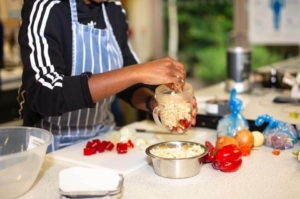Independent Life and Living
With the right intervention and support our students have the ability to lead as independent lives as they can. Whether it is taking charge of their own finances, understanding the housing system to make an informed choice about where they want to live, travelling independently to and from college and work, the world is at their hands. We work closely with students, families, adult social care and a range of other organisations so they are able to fulfil an independent life where they are in the driving seat.
Independent Life and Living at TWSC incorporates a range of key areas including:
1. Town and Travel Training – The goal is to support TWSC Young people in developing essential skills for independent living, including mobility, navigation, and social interaction in community settings. We address various aspects, such as using public transportation, crossing streets safely, understanding traffic signals, and interacting with others in public spaces. This is important because …

Independence: Travel training helps foster independence in individuals with SEND. Learning how to navigate public transportation systems or travel independently contributes to a sense of self-sufficiency and autonomy.
Community and employment Inclusion: Travel training facilitates inclusion in the community. Our students can participate more fully in community activities, social events, employment opportunities and educational opportunities when they have the skills to travel independently.
Safety Awareness: Learning how to travel includes understanding safety protocols and being aware of potential hazards. Travel training helps our young people to develop safety awareness skills, both in terms of personal safety and navigating public spaces.
Time Management: Traveling often requires students to manage their time effectively, such as planning routes, considering transportation schedules, and accounting for travel time. Developing time management skills is valuable for our young people in various aspects of life.
Reducing Dependence on Others: Travel training empowers our students to rely less on others for transportation. This reduction in dependence contributes to increased self-esteem and a sense of control over one’s life.
Stress Reduction: Learning how to navigate public transportation systems can reduce stress associated with unfamiliar or challenging travel situations. Confidence in traveling independently contributes to overall emotional well-being
2. Budgeting and Money Management – Teaching budgeting and money management to TWSC students is crucial for their overall well-being, independence, and successful integration into society. These skills are essential components of a comprehensive life skills curriculum for individuals with diverse abilities and needs. This part of our curriculum ensures our pupils gain Financial Independence and daily living skills…

Financial Independence: Developing budgeting and money management skills empowers our students to become more financially independent. This can lead to increased confidence and a sense of control over their lives
Daily Living Skills: Budgeting is a crucial aspect of daily living. Learning how to manage money helps our young people meet their basic needs, such as buying food, clothing, and personal items.
Social Inclusion: Money management is often linked to social participation. Being able to handle money effectively allows our students to engage in social activities, such as going out with friends, participating in community events, or joining clubs and organisations.
Preparation for Adulthood: Budgeting is a fundamental skill for adulthood. Our young people like anyone else, need to prepare for life beyond college. Learning how to budget prepares them for the financial responsibilities they will encounter as adults
Decision-Making Skills: Budgeting involves making choices about spending priorities. Developing these decision-making skills is essential for our students to make informed choices about how they allocate their resources.
Financial Security: Understanding budgeting helps our students plan for the future and build financial security. This includes saving for emergencies, setting aside funds for future goals, and avoiding unnecessary debt
Reducing Vulnerability: Financial literacy can help protect our young people from financial exploitation and scams. Understanding how to manage money wisely reduces vulnerability to financial abuse.
Employability: Learning budgeting skills can enhance employability. Many jobs involve handling money, and employers often value candidates who demonstrate financial responsibility.
3.Housing – learning about housing options is an integral part of the overall life planning process for our students. It empowers them to make choices that align with their unique needs, preferences, and aspirations, contributing to a more fulfilling and self-determined life. Understanding housing options empowers TWSC students to make informed choices about where and how they want to live. It supports their journey toward greater independence and autonomy….

4.Shopping for Living – Learning about shopping for living is a practical and holistic approach to developing a range of life skills for TWSC students These skills contribute to increased independence, community engagement, and overall well-being, fostering a sense of empowerment and self-determination. TWSC students develop daily Living Skills: Shopping for living involves essential daily living skills, such as buying groceries, household items, and personal care products. Developing these skills enhances independence and contributes to a more self-sufficient lifestyle….

Daily Living Skills: Shopping for living involves essential daily living skills, such as buying groceries, household items, and personal care products. Developing these skills enhances independence and contributes to a more self-sufficient lifestyle.
Nutrition and Meal Planning: Learning how to shop for food involves understanding nutrition and meal planning. This is important for maintaining a healthy and balanced diet, which is crucial for overall well-being.
Budgeting and Financial Literacy: Shopping requires budgeting skills, including comparing prices, making cost-effective choices, and staying within a budget. Developing financial literacy through shopping contributes to responsible money management.
Decision-Making Skills: The process of shopping involves making decisions about what to buy, where to buy it, and how much to spend. Developing decision-making skills in a shopping context is valuable for our young people in various aspects of life.
Community Engagement: Shopping is a common activity in the community. Learning how to navigate stores, interact with store staff, and engage with the community during shopping trips promotes social inclusion and community participation.
Understanding and Using Technology: Modern shopping often involves using technology, such as online shopping platforms or mobile apps. Learning how to navigate and use these technologies is an important aspect of staying connected and participating in society.
Personalised Preferences: Shopping allows individuals to express their personal preferences and make choices based on their likes and dislikes. This aspect of autonomy is crucial for our young people in asserting their individuality and making personal choices.
5.Food, Cooking and Catering – learning about food, cooking, and catering is a holistic approach to developing a range of life skills for TWSC students. These skills contribute to increased independence, social engagement, sensory development, and overall well-being. Additionally, cooking can be a source of joy and satisfaction….

Independence and Self-Sufficiency: Developing cooking skills allows our students to become more independent in meeting their nutritional needs. It fosters a sense of self-sufficiency as they can prepare meals for themselves.
Nutritional Knowledge: Learning about food and cooking involves understanding the nutritional value of different ingredients. This knowledge is essential for making healthy food choices and maintaining a balanced diet, contributing to overall well-being.
Meal Planning: Understanding how to plan and prepare meals involves organizational skills and the ability to sequence tasks. Meal planning is important for ensuring a varied and nutritious diet and can also be a valuable life skill for our young people
Sensory Development: Cooking engages multiple senses, including taste, smell, touch, and sight. For individuals with sensory sensitivities, exposure to various textures and flavours in the context of cooking can contribute to sensory development and integration
Vocational Skills: Cooking and catering skills can be transferable to vocational opportunities. Our students may explore career paths in the culinary industry or related fields, contributing to their vocational development.
The college will engineer residentials and activities to assess their trajectory towards a life of fulfilment and independence. At the very heart of this is Student Voice and Student Choice. In order to make an informed decision about this a variety of organisations such as adult social care, Citizens Advice, Travel Assistance employers and Banks will be welcomed in to college to support students with their next steps.





